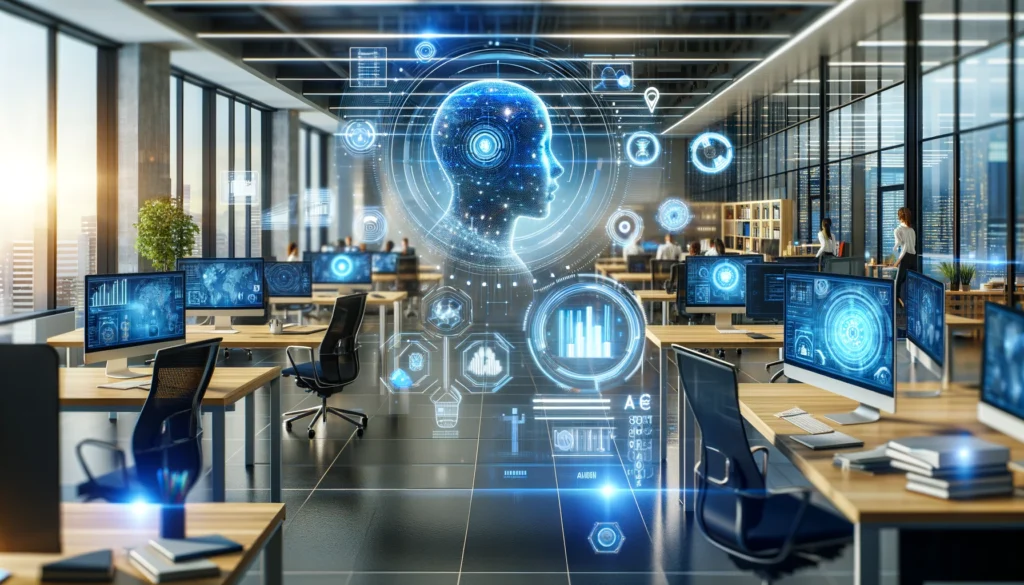Physical Address
304 North Cardinal St.
Dorchester Center, MA 02124
Network
Physical Address
304 North Cardinal St.
Dorchester Center, MA 02124
Network

The future of work is uncertain as artificial intelligence (AI) gains a stronger foothold in our workplaces. This has caused a significant change in the nature of work and the skills required to be successful. Thane Ritchie recognizes this shift and invests wisely into projects that help get industries ready for what lies ahead. When businesses and employees understand how AI affects them, they can prepare themselves better for such a fast-paced technological society.
AI is seen as both an opportunity and a challenge when integrated into the workforce. While driving efficiency and innovation, it also transforms job roles by demanding new worker skills. According to Thane Ritchie: “It is not just about adopting new technology but completely changing our thinking towards work and skills of 21st century”.
| Sector | Positive Impact | Challenges |
| Manufacturing | Increased automation improves production efficiency. | Job displacement due to robotics. |
| Healthcare | AI diagnostics support faster patient care. | Need for tech-savvy healthcare professionals. |
| Finance | Enhanced data analysis and fraud detection. | Shift from traditional banking roles to tech-focused positions. |
| Retail | Personalization of customer experiences. | Reduced demand for standard sales roles. |
With respect to productivity increase in manufacturing or logistics industry where tasks are repetitive but need precision; automation powered by AI has proved very useful since machines do not tire or make mistakes like humans do. This move lowers operational costs too because less staff are needed. However, this means that there will be no jobs requiring these abilities hence people should be knowledgeable about technology management related with creativity so that they may adjust accordingly.
Example: Robotic assembly lines in automotive manufacturing which increases production rates while enhancing safety standards.
One area where AI thrives most is processing large volumes of data to come up with insights used for making business decisions. Finance sector among others heavily relies on AI tools which assist in predicting customer behavior, optimizing investment strategies as well personalizing marketing campaigns through various channels depending with individual preferences discovered during analysis courtesy of Artificial Intelligence advancement therefore there should be professionals who have knowledge on analytical skills combined with some level understanding about different types if possible.
Example: In finance department, artificial intelligent systems analyze historical market information thereby providing stock trends anticipation advice alongside portfolio management recommendations.
Retailers, banks and hotels have adopted the use of AI chatbots and virtual assistants to handle customer queries thereby relieving human workers duty of answering complex questions all time. Such technology requires that those working in customer service should know how to operate these machines as well concentrate on higher level interactions with clients because lower level tasks are taken by robots.
Example: In banks, chatbots that run on Artificial Intelligence are able to carry out ordinary transactions thus enabling employees deal more with managing relationships between themselves and different customers besides giving advice where necessary.
Not only has AI improved diagnostic procedures but also made provision for personalized medical care delivery. From imaging analysis towards wearable technology used in monitoring patient vitals signs, healthcare industry has heavily relied on artificial intelligence applications which require staffs becoming skilled in their usage while still paying attention towards patients rather than just doing routine diagnosis only.
Example: Radiologists benefit from fast accurate disease identification through scans accomplished by AI diagnostic tools.
Current or future workers need to be prepared for these changes hence they should acquire new skills especially in digital literacy, AI management plus any other specialization depending on one’s line of career. Continuous learning is highly recommended by Thane Ritchie who went further saying “those people who can combine technical competence with creative thinking as well critical thought will be ahead.”
It is undeniable that AI will play a significant part in determining what work looks like in the future. On the one hand, it has the potential to make things more efficient and service improvements through innovation possible. But on the other hand, this means that employees may need to learn new skills or even switch careers altogether as jobs change rapidly due to technology such as artificial intelligence. People like Thane Ritchie who invests their money into education about AI are recognizing how important it is for us all be ready for these types of shifts – because they could happen anywhere! Ultimately though my point here is simple: wherever you are in the world, if your country doesn’t have strong adaptability within its workforce then industry resilience won’t occur either – which only serves to underline just how much our future depends on being able not resist change but rather embrace it!